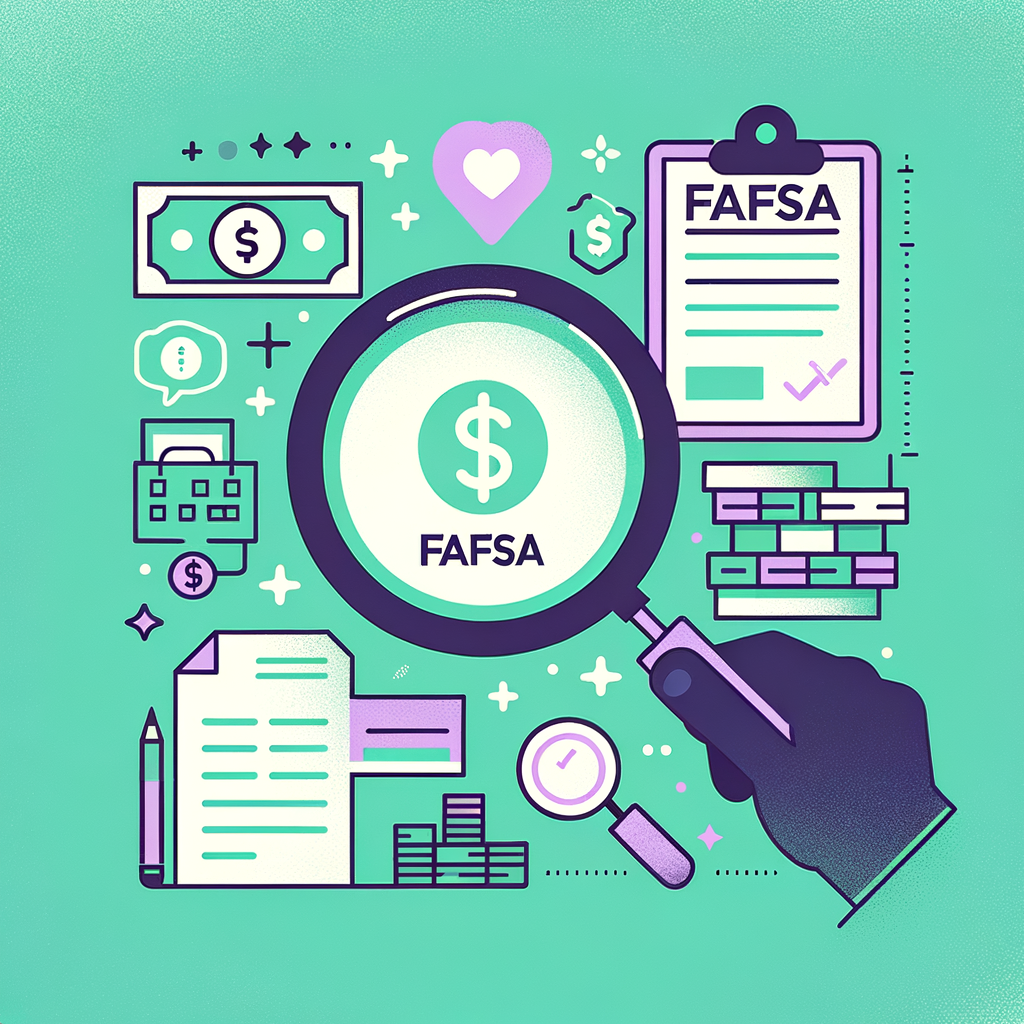Advertiser Disclosure
Last update: November 16, 2024
5 minutes read
How Does FAFSA Verify Assets and Does It Affect Eligibility for Aid?
Curious about FAFSA verification? Learn how this process affects your college aid and discover expert tips to navigate it successfully. Don't let verification derail your education dreams.

By Derick Rodriguez, Associate Editor
Edited by Brian Flaherty, B.A. Economics
Learn more about our editorial standards



By Derick Rodriguez, Associate Editor
Edited by Brian Flaherty, B.A. Economics
Learn more about our editorial standards
FAFSA verification is a crucial step in the financial aid process that affects approximately one-third of all applicants. This process can significantly affect your college funding, making it essential to understand and navigate effectively. In this comprehensive guide, we'll walk you through the verification process, required documents, timelines, and strategies for success. By the end, you'll be equipped with the knowledge to tackle FAFSA verification with confidence and secure the financial aid you need for your education.

Key takeaways
- FAFSA verification affects about one-third of all applicants and can affect your financial aid eligibility
- Using the IRS Data Retrieval Tool can significantly reduce the chances of being selected for verification
- Remember that verification is a normal part of the process and doesn't mean you've done anything wrong
What is FAFSA verification, and why does it matter?
FAFSA verification is a process used by the Department of Education and schools to ensure the accuracy of information provided on the Free Application for Federal Student Aid (FAFSA). It's not an audit or indication of wrongdoing, but rather a routine check to maintain the integrity of the financial aid system.
Remember, one of the best ways to manage a potential FAFSA verification is to provide honest and accurate information in the first place. That way, if verification occurs, you can stand by your answers and confirm their accuracy - or work to correct any honest mistakes that occurred in the process.
Why it matters:
- Verification can affect your eligibility for need-based aid
- Inaccuracies discovered during verification may lead to changes in your aid package
- Understanding the process helps you prepare and respond effectively
What documents do you need?
To streamline the verification process, gather these key documents:
- Tax return transcripts or W-2 forms
- Bank account statements
- Investment records
- Business and farm asset information (if applicable)

TuitionHero Tip
Create a "FAFSA Folder" (physical or digital) to keep all these documents organized and easily accessible.
Using the IRS Data Retrieval Tool: This tool automatically transfers your tax information to your FAFSA, reducing errors and the likelihood of being selected for verification.
A step-by-step guide to verify assets
- Receiving the verification notice: You'll be notified through your school or a note on your FAFSA Submission Summary.
- Completing the verification worksheet: Your school will provide this form to collect additional information.
- Submitting documentation: Provide all requested documents promptly to your school's financial aid office.
- Timeline: The process typically takes 2-4 weeks once all documents are submitted.

How to overcome common challenges
- Discrepancies in reported information: Double-check all entries and be prepared to explain any inconsistencies.
- Missing documents: Contact the relevant institutions (e.g., banks, employers) to obtain any missing paperwork quickly.
- Deadline pressure: Start the process early and communicate with your financial aid office if you anticipate delays.
What could verification mean for your financial aid?
Verification can lead to changes in your Student Aid Index (SAI) and, consequently, your aid package. However, significant changes are relatively rare.
In fact, in many cases, verification doesn’t result in any changes at all. Remember, just because the Department of Education wants to double-check some information doesn’t mean that the information is wrong. Some applications are even picked randomly, not because of any particular red flag!

TuitionHero Tip
Some states offer free college tuition for certain income brackets, regardless of verification outcomes!
Expert strategies for the verification process
- Respond promptly: Every day counts in securing your aid package.
- Double-check everything: A second look can catch errors before submission.
- Communication is key: Work closely with your financial aid office for guidance.
Compare private student loans now
TuitionHero simplifies your student loan decision, with multiple top loans side-by-side.
Compare Rates
Beyond verification: Next steps in your financial aid journey
- Review your updated aid offer carefully
- Understand the appeals process for special circumstances
- Start planning early for future FAFSA applications

Why trust TuitionHero
At TuitionHero, we help make paying for college easier. We offer guidance on student loans, scholarships, and refinancing. Plus, we provide insights on using credit cards to manage education costs and save on interest.
Frequently asked questions (FAQ)
The FAFSA verification process usually takes about 2-4 weeks once all required documents are submitted to your school's financial aid office.
However, this timeline can vary depending on the complexity of your financial situation and the workload of your school's financial aid department. It's crucial to submit all requested documents promptly to avoid delays in receiving your financial aid package.
Yes. Being selected for verification doesn't disqualify you from receiving financial aid. It's simply an extra step to ensure the accuracy of the information on your FAFSA.
As long as you provide the requested documentation and the information matches what you reported on your FAFSA, you'll still be eligible for financial aid. In some cases, verification might even result in an increase in your aid package if it reveals that you're eligible for more assistance.
If you're unable to provide some of the requested verification documents, don't panic. Contact your school's financial aid office immediately to explain your situation. They may be able to suggest alternative documents or ways to verify your information.
In some cases, they might be able to use professional judgment to make adjustments based on your unique circumstances. The key is to communicate openly and honestly with your financial aid administrators.
While there's no guaranteed way to avoid verification, you can reduce your chances by using the IRS Data Retrieval Tool when filing your FAFSA. This tool automatically transfers your tax information directly from the IRS to your FAFSA, reducing the likelihood of errors.
Additionally, double-check all information before submitting your FAFSA, avoid leaving fields blank, and be consistent with the information you provide.
Final thoughts
Navigating FAFSA verification may seem like a challenge, but with the right approach, it's a manageable part of the financial aid process. Remember, accuracy and promptness are key to securing your college funding.
Stay organized, communicate effectively with your financial aid office, and don't hesitate to ask for help when needed. With these strategies in hand, you're well-equipped to successfully navigate the verification process and focus on your educational journey.
For personalized help with your FAFSA verification process, don't hesitate to reach out to your school's financial aid advisors or use official FAFSA planning tools.
Source
- Guide To FAFSA Verification | Bankrate
- Documents Needed for the FAFSA and Other Financial Aid Forms | Appily
- Yes, FAFSA Verifies Assets and Here’s How | Grantford Financial Aid Blog
- Guide To FAFSA Verification | Bankrate
- Verifying Assets | Knowledge Center
- 2025-26 FAFSA Checklist: What You’ll need to Complete Your Application | Fastweb
- Verification - Finaid
- Reporting Your Assets on the FAFSA | Discover Student Loans
- 6 Things Students Need Before They Fill Out the 2024–25 FAFSA® Form
- Filling Out the FAFSA | 2024-2025 Federal Student Aid Handbook
Author

Derick Rodriguez
Derick Rodriguez is a seasoned editor and digital marketing strategist specializing in demystifying college finance. With over half a decade of experience in the digital realm, Derick has honed a unique skill set that bridges the gap between complex financial concepts and accessible, user-friendly communication. His approach is deeply rooted in leveraging personal experiences and insights to illuminate the nuances of college finance, making it more approachable for students and families.
Editor

Brian Flaherty
Brian is a graduate of the University of Virginia where he earned a B.A. in Economics. After graduation, Brian spent four years working at a wealth management firm advising high-net-worth investors and institutions. During his time there, he passed the rigorous Series 65 exam and rose to a high-level strategy position.
At TuitionHero, we're not just passionate about our work - we take immense pride in it. Our dedicated team of writers diligently follows strict editorial standards, ensuring that every piece of content we publish is accurate, current, and highly valuable. We don't just strive for quality; we aim for excellence.
Related posts
While you're at it, here are some other college finance-related blog posts you might be interested in.
Shop and compare student financing options - 100% free!

Always free, always fast
TuitionHero is 100% free to use. Here, you can instantly view and compare multiple top lenders side-by-side.

Won’t affect credit score
Don’t worry – checking your rates with TuitionHero never impacts your credit score!

Safe and secure
We take your information's security seriously. We apply industry best practices to ensure your data is safe.
Finished scrolling? Start saving & find your private student loan rate today



